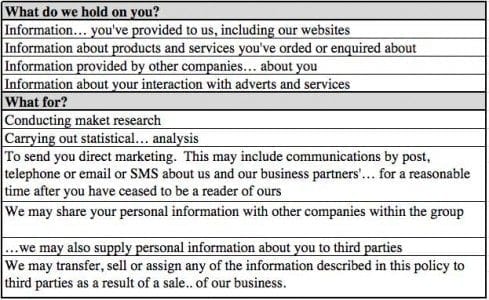Let’s look at the Daily Mail’s privacy policy
Until newspapers adopt the same high clarity and data protection standards as DMA members, their frequent “junk mail and data” rants and devious targeting methods display blatant hypocrisy. It’s time we started revealing their home truths.
According to the Daily Mail people in the UK are suffering from “An avalanche of junk mail: Nearly half daily postbag is now direct marketing … the Royal Mail wants us to get even more!” and “Millions are facing junk mail deluge: Secret Royal Mail plan to deliver marketing letters to shoppers who simply click on a product online”.
Oh really?
It’s about time we direct marketers became equally vocal about the hypocrisy of this newspaper and demanded balanced, informed writing.
In the late 1990s I worked to embed the culture of data into national and regional newspapers; first at the Telegraph; then News International; and finally the regional press, which was paranoid about the impact of the infant internet’s cannibalisation of classified advertising. They all regarded data as their saviour.
Newspapers wanted to understand readers and use this direct relationship to benefit advertisers.
We collected questionnaire and phone data on everything from test drives, loans and insurance for telemarketing campaigns to readership data to boost subscriptions.
20 years’ later, the Internet provides huge amounts of fresh data and the legislators are changing the structures.
While marketers do not shy from legitimate criticism, the Daily Mail is conducting an anti-direct marketing/fundraising rabble-rousing campaign rather than using informed argument which reflects the nuanced position of data in business and society.
Data is sometimes collected under false pretences and used badly. More usually, it is collected fairly and used to enhance customer experience and improve business efficiency. The “data is scary and fundraising/ direct marketing is bad” message might go down well with Daily Mail readers, but it can hardly be described as knowledgeable, unbiased reporting.
Here is an example of the privacy policy of a newspaper committed to the use of direct marketing though highly-critical of other brands’ use of the discipline.

Here’s a summary of what the Daily Mail website says about the data it collects
This approach certainly allows for a lot of data to be collected and provides permission for that data to be used for a wide range of purposes including direct marketing. The data might come from third parties and be passed onto third parties and if the business is sold, any personal data might also be sold.
No doubt the Daily Mail would condemn such wide-ranging data permissions as a “shocking” attempt by a “well respected national institution” to “avalanche people with direct marketing.”
It would probably say: “Pray this company isn’t sold, because all the information it holds on you might be sold as well.” It would probably reveal that “investigative journalists” had discovered the newspaper had been combining information on you from other companies with data it has collected to help “its rich advertisers to sell to you”.
As you will have guessed, the words above are taken from the Daily Mail’s privacy policy.

David Cole is Managing Director and Founder of FastMap. At the cutting edge of data and research throughout his career, David launched the UK’s first newspaper readership panel whilst at The Telegraph. As MD of CCB and fast.MAP David has supported the DMA and IoF with important tracking studies (IoF Fundraising Media DNA).
In 2014 fast.MAP launched the Data Permissions Benchmark offering brands a process to increase the amount of donors/consumers that consent to their marketing now used by charities such as Cancer Research UK, RSPCA and Royal British Legion. David is Research Champion for the IOF Insight SIG and member of the IOF Task Group reviewing consent preferences.
Main image: data and privacy padlocks by Maksim Kabakou on Shutterstock.com


